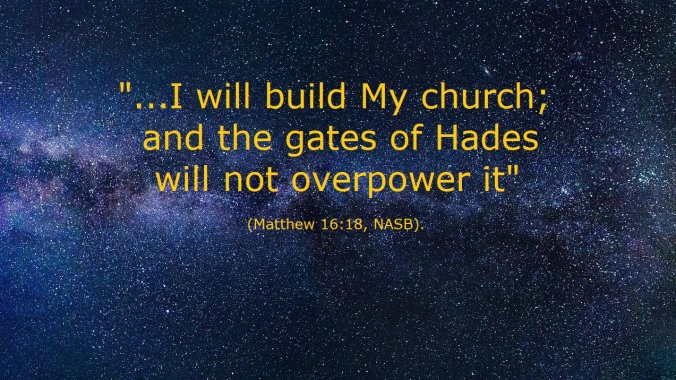“Go therefore and make disciples of all the nations…teaching them to observe all that I commanded you; and lo, I am with you always, even to the end of the age” (Matthew 28:19-20, NASB).
——————–
Contents:
1) What is a Parable? (Bill Crews)
2) Is All Evil Sin? (Tom Edwards)
——————–

-1-
What is a Parable?
Bill Crews
While this is a study of subject matter found in the New Testament, it is worthy of note that the word “parable” can be found in English translations of the Old Testament. In both the King James Version and the American Standard Version it appears some eighteen times, all from the same word (MASHAL), which word is also rendered “by-word” (1), “like” (1) and “proverb” (19 times). In the New King James Version and the New American Standard Version the word “parable” appears far fewer times (just 4 or 5). The translators preferred “oracle” or “discourse” instead. MASHAL is defined in Strong’s Concordance as “a pithy maxim, usually of a metaphorical nature; hence a simile (as an adage, poem, discourse).” In Wilson’s Old Testament Word Studies it is defined as “a comparison, similitude, parable; a sentiment, maxim; a proverb, by-word, satire.”
We also find some Old Testament passages that have to do with the parables of Christ in the New Testament. Psalm 78:2 (attributed to Asaph) says, “I will open my mouth in a parable; I will utter dark sayings of old.” In Matthew 13:34-35 this passage is referred to as a prophecy which Jesus fulfilled by speaking in parables. It reads: “All these things Jesus spoke to the multitude in parables; and without a parable He did not speak to them, that it might be fulfilled which was spoken by the prophet saying: ‘I will open My mouth in parables; I will utter things which have been kept secret from the foundation of the world.’” Isaiah 6:9-10 apparently has a dual application — to the Israelites in Isaiah’s day and to the Jews who heard the parables of Jesus. See Matthew 13:14-15 where this Isaiah passage is quoted and which appears between the parable of the sower (vv. 1-9) and the explanation of that parable (vv. 18-23).
The word “parable” in the New Testament, except for John 10:6 (PAROIMIA in the original, meaning an “adage” or “dark saying,” rendered “parable” only in the KJV and the ASV), is always from the Greek word PARABOLE, a word which the translators chose, not to translate, but to transliterate (transpose the Greek letters into English letters) and anglicize (give it an English-sounding ending). You already knew that this is how they came up with “baptize” and “baptism” rather than translating the Greek words for “im-merse” and “immersion.” The word “parable” appears sixteen times in Matthew, twelve times in Mark, seventeen times in Luke, and once in John in some translations (as noted previously). We will be examining some of the parables spoken by Jesus in the first three books of the New Testament. In some instances they are specifically referred to as parables; in others they are not, even though it is obvious that they are.
What is a “Parable”?
Vine’s Expository Dictionary of N.T. Words (Vol. III, p. 158) says, “PARABOLE — literally denotes a placing beside (akin to paraballo, to throw or lay beside, to compare). It signifies a placing of one thing beside another with a view to comparison. It is generally of a somewhat lengthy utterance or narrative drawn from nature or human circumstances, the object of which is to set forth a spiritual lesson … sometimes it is used of a short saying or proverb.” Vine’s also warns of two dangers: “that of ignoring the important features, and that of trying to make all the details mean something.”
Generally, a parable was designed to teach one central truth, and was called for by the circumstances present and the attitude of the listeners for whom it was intended. J. H. Thayer’s A Greek-English Lexicon of the N. T., p. 479, says of PARABOLE: “1. a placing of one thing by the side of another, juxtaposition, as of ships in battle … 2. metaphorically, a comparing, comparison of one thing with another, likeness, similitude … specifically, a narrative, fictitious but agreeable to the laws and usages of human life, by which either the duties of men or things of God, particularly the nature and history of God’s kingdom are figuratively portrayed … 3. a pithy and instructive saying, involving some likeness or comparison and having perceptive or admonitory force; an aphorism, a maxim…”
A parable, unlike a fable (which attributes human characteristics and actions to animals, plants and inanimate things) is a story or statement involving people and things and actions that were true to life and familiar to those who were listening. Its purpose was to bring out, illustrate and emphasize a spiritual lesson or lessons. At times Jesus explained the meaning. At times He did so when asked by His disciples. But usually He simply told the parable, allowing the listeners to ponder the meaning. A common and abbreviated way of putting it: “A parable is an earthly story with a heavenly meaning.” A definition not quite broad enough.
All of the New Testament parables were spoken by Jesus and appear in Matthew, Mark and Luke. There are none in John, Acts or the epistles (although the latter do contain rhetorical allegories and similes). The Revelation is filled with metaphorical language (signs and symbols), but contains no parables. Mark contains only one parable (the Seed Growing in Secret, 4:26) not found in Matthew or Luke; the others, the Sower, the Mustard Seed and the Wicked Husbandmen, are also in Matthew and Luke. Matthew and Luke contain two in common, the Leaven (Matt. 13:33 and Lk. 13:20-21) and the Lost Sheep (Matt. 18:12ff and Lk. 15:3ff; not necessarily spoken on the same occasion). Ten parables are peculiar to Matthew: the Tares, the Hidden Treasure, the Pearl of Great Price, the Draw Net, the Unmerciful Servant, the Laborers in the Vineyard, the Two Sons, the Marriage of the King’s Son, the Ten Virgins and the Talents. Seventeen parables are peculiar to Luke: the Two Debtors, the Good Samaritan, the Friend at Midnight, the Rich Fool, the Watchful Servants, the Barren Fig Tree, the Chief Seats, the Great Supper, the Rash Builder, the Rash King, the Lost Coin, the Lost Son(s), the Unrighteous Steward, the Unprofitable Servant, the Unrighteous Judge, the Pharisee and the Publican and the Pounds.
The parables of Christ are striking and designed to make a deep impression, thus making it easier to remember the lessons they were designed to teach. They are drawn from such categories as building or construction, farming, tending animals, cooking and housekeeping, finding treasures, fishing, stewardship, weddings, marriage and other feasts, masters and slaves, employers and employees, worshiping God in prayer, persistence in prayer, inheritances, relation of the old covenant to the new and other matters. The lessons they teach have to do with individual responsibilities, duties toward others, the mercy of God, forgiving and being forgiven, the concern of God for the lost, the worth of citizenship in the Lord’s kingdom, the results of preaching the gospel, the nature of the Lord’s kingdom and being prepared for the coming judgment. Many are introduced with the words: “the kingdom of heaven (or God) is like …” The kingdom would be open to Gentiles as well as Jews. As the end of His ministry drew near and the time for His crucifixion came closer, the parables became more pointed in their depiction of the unbelieving Jewish leaders.
In the next article we will consider the Lord’s reasons for teaching in parables and some things that will aid in understanding their lessons
— Via Roanridge Reader, August 5, 2018, Volume 33, Issue 31, pages 2-3
——————–
-2-
Is All Evil Sin?
Tom Edwards
All sin is evil, but not all evil is sin. Sometimes “evil” (in the Bible) is referring to “distress, misery, injury, calamity” (part of Brown-Driver-Briggs’ Hebrew Definitions for “evil” H7451). For example, God said, “…I am bringing calamity on the house of Jeroboam, and will cut off from Jeroboam every male person, both bond and free in Israel, and I will make a clean sweep of the house of Jeroboam…” (1 Kings 14:10, NASB). The LORD also speaks of bringing “calamity on Jerusalem and Judah” (2 Kings 21:12, NASB). The King James Version uses the word “evil” (instead of “calamity”) in these passages. And the fact that it was the Lord Himself who brought about this “evil” indicates that it could not have been something sinful. For the Lord has never sinned, nor ever will.
——————–
The Steps That Lead to Eternal Salvation
1) Hear the gospel, for that is how faith comes (Rom. 10:17; John 20:30-31).
2) Believe in the deity of Christ (John 8:24; John 3:18).
3) Repent of sins (Luke 13:5; Acts 17:30).
4) Confess faith in Christ (Rom. 10:9-10; Acts 8:36-38).
5) Be baptized in water for the remission of sins (Mark 16:16; Acts 2:38; 22:16; Rom. 6:3-4; Gal. 3:26-27; 1 Pet. 3:21).
6) Continue in the faith, living for the Lord; for, if not, salvation can be lost (Heb. 10:36-39; Rev. 2:10; 2 Pet. 2:20-22).
——————–
Tebeau Street
CHURCH OF CHRIST
1402 Tebeau Street, Waycross, GA 31501
Sunday services: 9:00 a.m. (Bible class); 10 a.m. & 5 p.m. (worship)
Wednesday: 7 p.m. (Bible class)
evangelist/editor: Tom Edwards (912) 281-9917
Tom@ThomasTEdwards.com
http://thomastedwards.com/go (Older version of Gospel Observer website without pictures, but back to March 1990)
http://tebeaustreetchurchofchrist.org/
http://ThomasTEdwards.com/audioser.html (audio sermons)













